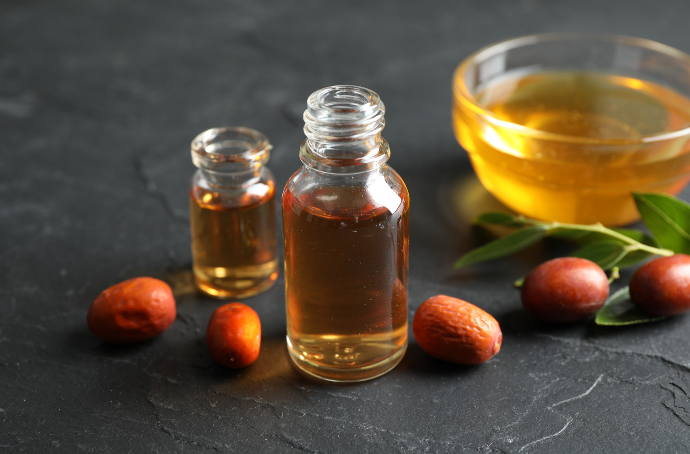Hemp seed oil
is a wonderful ingredient for skincare products, as it is rich in many beneficial nutrients that promote healthy skin. It is a natural source of antioxidants and has anti-inflammatory properties that can help reduce redness and irritation. Additionally, hemp seed oil is an excellent moisturiser, as it helps to lock in moisture and keep the skin hydrated throughout the day.

When used in skincare products, hemp seed oil can also help to regulate oil production, making it a great choice for those with oily or acne-prone skin. It is also gentle enough for sensitive skin, making it a versatile ingredient that can benefit a wide range of skin types.
1.
Anti-ageing benefits:
Hemp seed oil is rich in antioxidants and fatty acids that help to reduce the appearance of fine lines and wrinkles, and improve overall skin texture.
2.
Moisturising effects:
Hemp seed oil is a natural humectant, which means it helps to draw moisture to the skin, keeping it hydrated and plump. Hemp seed oil is a great source of fatty acids that help to moisturise and nourish the skin.
3.
Soothing properties:
Hemp seed oil has anti-inflammatory properties that can help to calm irritated skin and reduce redness.
4.
Acne-fighting abilities:
Hemp seed oil contains linoleic acid, which has been shown to reduce the occurrence of acne and other skin blemishes.
5.
Non-comedogenic:
Unlike some other oils, hemp seed oil has a
comedogenic rating
of zero, which means it won't clog pores or contribute to acne.
6.
Overall skin health:
The vitamins and minerals found in hemp seed oil, like vitamin E and zinc, can help to protect the skin from environmental damage and promote overall skin health.
Grapeseed oil
is a popular ingredient in skincare products due to its numerous benefits. It is rich in antioxidants and contains essential fatty acids, making it a great choice for moisturising and protecting the skin.

One of the major benefits of grapeseed oil is that it is easily absorbed by the skin, providing long-lasting moisture without leaving a greasy or heavy feeling. It also contains linoleic acid, which can help to strengthen the skin barrier and improve the overall texture and appearance of the skin.
In addition to its moisturising properties, grapeseed oil also has anti-inflammatory and antimicrobial properties, which can help to soothe and calm irritated or inflamed skin. It is also high in vitamin E, which is a powerful antioxidant that can help to protect the skin from free radical damage and promote a healthy, youthful glow.
Overall, grapeseed oil is a versatile and effective ingredient in skincare products, offering a wide range of benefits for all skin types. Whether you are looking for a lightweight moisturiser or a soothing treatment for acne-prone or sensitive skin, grapeseed oil is an excellent choice.
1. Contains
antioxidants
that help to protect the skin from free radical damage.
2. It has
anti-inflammatory
properties that can help to soothe and calm irritated skin.
3. The oil is lightweight and
easily absorbed
, making it a great moisturiser for all skin types.
4. Grapeseed oil has been shown to
improve skin elasticity and firmness.
5. It can help to reduce the appearance of fine lines and wrinkles.
6. The oil is rich in
vitamin E
, which can help to nourish and strengthen the skin.
7. Grapeseed oil is
non-comedogenic
, meaning it won't clog pores or cause breakouts.
8. It can be used as a carrier oil to dilute essential oils for use in aromatherapy or massage.
9. Grapeseed oil has a neutral scent and can be used in a variety of skincare products, including moisturisers, serums, and facial oils.
Rosehip oil
is a highly beneficial ingredient in skincare products. It has a wealth of properties that make it an attractive choice for many people. Its effectiveness in reducing fine lines and wrinkles, improving hydration, and reducing acne scars make it a highly sought-after ingredient in the skincare industry.

One of the key benefits of rosehip oil is that it is a natural source of vitamin A, which is essential for healthy skin. It is also a rich source of vitamin C, which helps to promote collagen production and improve skin elasticity.
Additionally, rosehip oil has antioxidant properties which help to protect the skin from environmental damage. The comedogenic rating of rosehip oil is between 1 and 2 on the comedogenic scale, making it a relatively safe oil to use on the skin.
It is non-greasy, lightweight and quickly absorbs into the skin, making it an excellent choice for all skin types.
These unique properties make rosehip oil an ideal choice for anyone looking to improve the health and appearance of their skin.
Rosehip oil has many benefits for the skin, including:
1.
Hydration:
Rosehip oil is very hydrating and can help to plump and moisturise the skin.
2.
Anti-ageing:
Rosehip oil is rich in antioxidants, which can help to protect the skin from damage and reduce the appearance of fine lines and wrinkles.
3.
Brightening:
Rosehip oil contains vitamin C, which can help to brighten the skin and even out skin tone.
4.
Healing:
Rosehip oil is rich in vitamin A, which can help to heal damaged skin and reduce the appearance of scars and stretch marks.
5.
Anti-inflammatory:
Rosehip oil has anti-inflammatory properties, which can help to reduce redness and inflammation in the skin.
Overall, using rosehip oil in your skincare routine can help to keep your skin looking healthy, radiant, and youthful.

Jojoba oil
is one of the most popular and effective natural ingredients in skincare products. It is derived from the seeds of the jojoba plant and has a wide range of properties that make it a great choice for any skin type.

One of the primary benefits of jojoba oil is its ability to moisturise and hydrate the skin. Jojoba oil penetrates deep into the skin and helps to regulate oil production, leaving the skin feeling soft, smooth, and supple.
Another important property of jojoba oil is its ability to reduce inflammation and irritation. This makes it particularly useful for people who suffer from skin conditions such as acne, eczema, or psoriasis. Jojoba oil contains natural anti-inflammatory compounds that help to soothe the skin and reduce redness and swelling.
Jojoba oil is widely touted as being non-comedogenic, meaning unlikely to clog pores. However, it does have a comedogenic rating of 2 out of 5, which means it has the potential to clog pores for some individuals. It's important to patch-test any new product before using it on your entire face to see if it works well for your skin. (Our
Face To Feet moisturising
range does not contain Jojoba Oil).
Overall, jojoba oil is an excellent ingredient to look for in your skincare products. Its unique properties and numerous benefits make it a must-have for anyone who wants to keep their skin healthy and glowing.
Properties and benefits of Jojoba Oil in skincare products:
1. Rich in Vitamins E and B complex, as well as minerals like copper, zinc, and iodine.
2. Similar in composition to human sebum, which makes it easily absorbed and non-greasy.
3. Has anti-inflammatory properties that can help soothe and calm the skin.
4. Can help regulate sebum production, which can both moisturise dry skin and reduce the appearance of oily skin.
5. May help reduce the appearance of fine lines and wrinkles by promoting collagen production.
6. Has antimicrobial properties that can help fight acne-causing bacteria.
7. Can help protect the skin from environmental stressors like pollution and UV rays.

Sweet almond oil
is a popular ingredient in skincare products due to its numerous benefits. Some of these include its ability to deeply moisturise the skin without leaving a greasy residue, as well as its high vitamin E content which can help with anti-ageing and reducing the appearance of scars.

Sweet almond oil has a comedogenic rating of 2 out of 5, meaning that it has a moderate chance of clogging pores. It can still be used in skin care products, but caution should be exercised for those with very acne-prone skin.
Other benefits include its ability to soothe dry and irritated skin, and its anti-inflammatory properties that can help with conditions like eczema and psoriasis.
Overall, sweet almond oil is a versatile and beneficial ingredient to include in your skincare routine.
Properties and benefits of sweet almond oil used in skincare products:
1. Rich in vitamins A, B, and E, which are essential for healthy skin
2. Helps promote a youthful appearance by reducing fine lines and wrinkles
3. Soothes dry and itchy skin
4. Helps treat skin conditions such as eczema and psoriasis
5. Helps improve skin complexion and tone
6. Easily absorbed into the skin without leaving a greasy residue
7. Can be used as a carrier oil for essential oils


